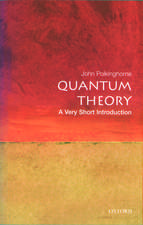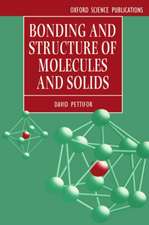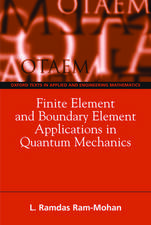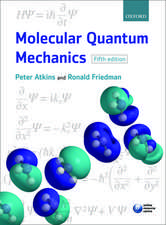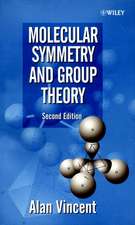Hybrid Methods of Molecular Modeling: Progress in Theoretical Chemistry and Physics, cartea 17
Autor Andrei L. Tchougréeffen Limba Engleză Hardback – 6 aug 2008
Hybrid Methods of Molecular Modeling presents its material in a sequential way paying attention both to the physical soundness of the approximations used and to the mathematical rigor necessary for practical developing of the robust modeling code. Historical remarks are given when it is necessary to put the current presentation in a more general context and to establish relation with other areas of computational chemistry. The reader should have experience with basic concepts of computational chemistry and/or molecular modeling. Basic knowledge of operators, wave functions, electron densities is necessary.
| Toate formatele și edițiile | Preț | Express |
|---|---|---|
| Paperback (1) | 3016.98 lei 6-8 săpt. | |
| SPRINGER NETHERLANDS – 22 noi 2010 | 3016.98 lei 6-8 săpt. | |
| Hardback (1) | 3023.14 lei 6-8 săpt. | |
| SPRINGER NETHERLANDS – 6 aug 2008 | 3023.14 lei 6-8 săpt. |
Din seria Progress in Theoretical Chemistry and Physics
-
 Preț: 391.79 lei
Preț: 391.79 lei - 18%
 Preț: 1238.74 lei
Preț: 1238.74 lei - 18%
 Preț: 1234.77 lei
Preț: 1234.77 lei - 18%
 Preț: 1236.51 lei
Preț: 1236.51 lei - 18%
 Preț: 1222.62 lei
Preț: 1222.62 lei - 18%
 Preț: 1230.53 lei
Preț: 1230.53 lei - 18%
 Preț: 945.30 lei
Preț: 945.30 lei - 18%
 Preț: 1231.16 lei
Preț: 1231.16 lei - 15%
 Preț: 697.15 lei
Preț: 697.15 lei - 18%
 Preț: 956.69 lei
Preț: 956.69 lei - 18%
 Preț: 1214.90 lei
Preț: 1214.90 lei - 18%
 Preț: 1233.52 lei
Preț: 1233.52 lei - 18%
 Preț: 1224.99 lei
Preț: 1224.99 lei - 18%
 Preț: 1822.14 lei
Preț: 1822.14 lei - 18%
 Preț: 1548.56 lei
Preț: 1548.56 lei - 18%
 Preț: 1845.48 lei
Preț: 1845.48 lei - 18%
 Preț: 1233.06 lei
Preț: 1233.06 lei - 18%
 Preț: 955.56 lei
Preț: 955.56 lei - 18%
 Preț: 1223.74 lei
Preț: 1223.74 lei - 24%
 Preț: 1069.41 lei
Preț: 1069.41 lei - 18%
 Preț: 956.69 lei
Preț: 956.69 lei - 18%
 Preț: 953.52 lei
Preț: 953.52 lei - 18%
 Preț: 954.45 lei
Preț: 954.45 lei - 18%
 Preț: 1223.74 lei
Preț: 1223.74 lei -
 Preț: 390.63 lei
Preț: 390.63 lei -
 Preț: 390.25 lei
Preț: 390.25 lei
Preț: 3023.14 lei
Preț vechi: 3686.76 lei
-18% Nou
Puncte Express: 4535
Preț estimativ în valută:
578.46€ • 603.97$ • 478.76£
578.46€ • 603.97$ • 478.76£
Carte tipărită la comandă
Livrare economică 05-19 aprilie
Preluare comenzi: 021 569.72.76
Specificații
ISBN-13: 9781402081880
ISBN-10: 140208188X
Pagini: 364
Ilustrații: XVIII, 344 p.
Dimensiuni: 155 x 235 x 25 mm
Greutate: 0.69 kg
Ediția:2008
Editura: SPRINGER NETHERLANDS
Colecția Springer
Seria Progress in Theoretical Chemistry and Physics
Locul publicării:Dordrecht, Netherlands
ISBN-10: 140208188X
Pagini: 364
Ilustrații: XVIII, 344 p.
Dimensiuni: 155 x 235 x 25 mm
Greutate: 0.69 kg
Ediția:2008
Editura: SPRINGER NETHERLANDS
Colecția Springer
Seria Progress in Theoretical Chemistry and Physics
Locul publicării:Dordrecht, Netherlands
Public țintă
Professional/practitionerCuprins
Molecular modeling: Motivation and general setting.- Molecular potential energy.- Basics of quantum mechanical technique.- Alternative representations.- Basics of quantum chemistry.- Alternative tools.- Separating electronic variables.- Hybrid perspective: Ab initio methods.- Pseudopotential methods and valence approximation.- Hartree-Fock-Roothaan based semiempirics.- Non-Hartree-Fock semiempirics.- Molecular mechanics.- Hybrid methods for complex systems.- Deductive molecular mechanics: Motivation.- Electronic structure in SLG approximation.- DMM family.- What is DMM?.- Intersubsystem frontier.- Conclusion.- Coordination compounds: Characteristic of coordination compounds (CCs).- Hybrid and classical models of CCs.- Qualitative picture of bonding in metal complexes.- Hybrid model for CCs.- Mechanistic model for stereochemistry of CCs.- Hybrid models of spin-active compounds.- Conclusion.
Recenzii
From the reviews:
"This book is an advanced treatise on hybrid methods of molecular modeling. It provides a thorough and relatively self-contained presentation of the theoretical foundations of hybrid modeling with detailed derivations of the key equations and discussion of approximations for their solution. … As such, this is a very useful reference for graduate students, practicing experts, and developers … . Overall, this book is a novel contribution to the field of hybrid modeling that lays the foundation for formulating a useful general QM/MM modeling approach." (Darrin York, Journal of the American Chemical Society, Vol. 131 (42), 2009)
"This book is an advanced treatise on hybrid methods of molecular modeling. It provides a thorough and relatively self-contained presentation of the theoretical foundations of hybrid modeling with detailed derivations of the key equations and discussion of approximations for their solution. … As such, this is a very useful reference for graduate students, practicing experts, and developers … . Overall, this book is a novel contribution to the field of hybrid modeling that lays the foundation for formulating a useful general QM/MM modeling approach." (Darrin York, Journal of the American Chemical Society, Vol. 131 (42), 2009)
Textul de pe ultima copertă
Hybrid Methods of Molecular Modeling is a self-contained advanced review volume. It provides a step by step derivation of the consistent theoretical picture of hybrid modeling methods and a thorough analysis of the concepts and current practical methods of hybrid modeling based on this theory.
The book presents its material sequentially, paying attention both to the physical soundness of the approximations used and to the mathematical rigor necessary for the practical development of the robust modeling code. Historical remarks are given when it is necessary to put the current work in a more general context and to establish a relationship with other areas of computational chemistry.
The reader should have experience with the rudimentary concepts of computational chemistry and/or molecular modeling. A basic knowledge of operators, wave functions, and electron densities is required. The book is also intended both for practicing experts in computational materials science, nanoscience, biochemistry, and those who are interested in broadening their knowledge with the current concepts of hybrid modeling and its limitations.
The book presents its material sequentially, paying attention both to the physical soundness of the approximations used and to the mathematical rigor necessary for the practical development of the robust modeling code. Historical remarks are given when it is necessary to put the current work in a more general context and to establish a relationship with other areas of computational chemistry.
The reader should have experience with the rudimentary concepts of computational chemistry and/or molecular modeling. A basic knowledge of operators, wave functions, and electron densities is required. The book is also intended both for practicing experts in computational materials science, nanoscience, biochemistry, and those who are interested in broadening their knowledge with the current concepts of hybrid modeling and its limitations.
Caracteristici
Presents a rigorous treatment of the derivations of hybrid methods of molecular modeling Explains the concepts and current methodologies of hybrid methods Explicitly describes the approximations assumed in the modeling code Applies theoretical hybrid methods to problems of importance to chemists, biochemists, and materials researchers Includes supplementary material: sn.pub/extras

